Meloney Perry once worked at a traditional big law firm with a formal, corporate atmosphere, and knew she wanted a different culture at her own firm.
"I learned the 'old school' way, but it's changed," says Perry, founder of Perry Law in Dallas. "Nowadays, with the employees coming in younger, you do have to have more of a family feel."
Click to Gallery
Meloney Perry once worked at a traditional big law firm with a formal, corporate atmosphere, and knew she wanted a different culture at her own firm.
"They want to be home. They want to be watching the playoffs while they work," Perry says.
They also need an atmosphere that's less rigid than old-style corporate environments. Owners have come to recognize that reading personal email, texting friends and doing online searches for personal matters are a part of life, and not just for younger people. Baby boomer staffers are just as likely to be checking their phones periodically during the day as their younger colleagues are.
Owners who want a good culture will need to be aware of their interactions with staffers — what they do can have a greater impact than what they say.
"People live down to your expectations rather than up to them" when they're over-controlled, Fross says. "You need to give people incentives and make it easy from a decision-making perspective to do the things you want them to do."
That means allowing more casual attire when clients aren't around, and giving staffers laptops so they don't have to work long hours at their desks.
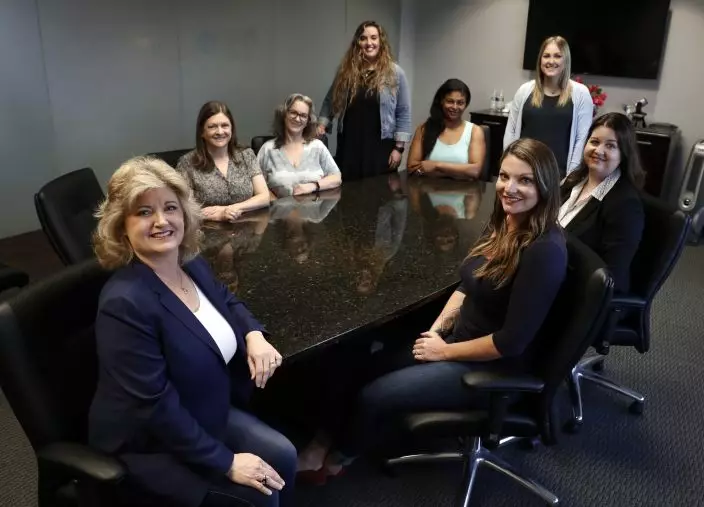
In this Tuesday, May 14, 2019, photo, business owner Meloney Perry, left front, poses for a photo with members of her staff, Karla Roush, from left rear, Lisa Amerson, Michelle Smith, Lauren Pickett, Samantha Doherty, Stacy Thompson and Brooke Bailey, right front, at her law firm in Dallas. Small business owners are making their company culture a bigger priority as they respond to the dramatically different expectations of a younger work force and a low unemployment rate that makes it harder to find staffers. (AP PhotoTony Gutierrez)
"They want to be home. They want to be watching the playoffs while they work," Perry says.
Small businesses' cultures are becoming a bigger priority as more owners respond to the dramatically different expectations of a younger work force and a low unemployment rate and shrinking labor pool that make it harder to find staffers. In a survey released last fall by Bank of America, a quarter of the 1,067 owners surveyed said they were shifting to more flexible cultures in hopes of attracting the workers they want. Companies are creating environments that recognize staffers' need for growth in their careers, more balance between their work and personal lives and open communication. And to have a role in the company's direction — employees don't want to just do their work and keep quiet.
"They want to feel appreciated and be included in the firm decisions," Perry says.
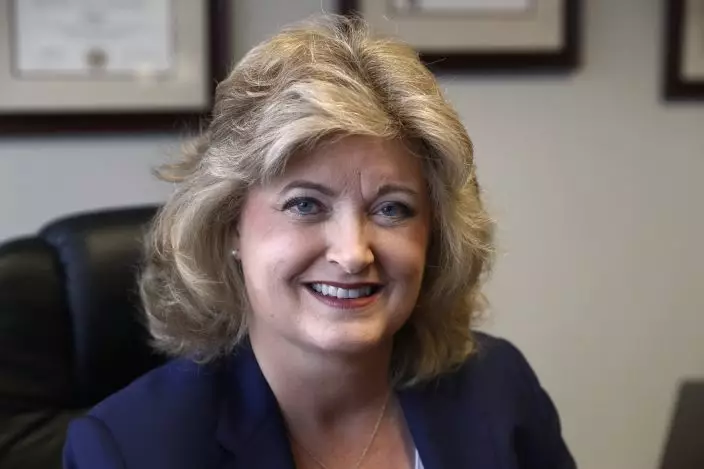
In this Tuesday, May 14, 2019, photo, business owner Meloney Perry, of Perry Law, poses for a portrait in her office at her law firm in Dallas. Perry once worked at a traditional big law firm with a formal, corporate atmosphere, and knew she wanted a different culture at her own firm. “I learned the ‘old school’ way, but it’s changed,” says Perry. “Nowadays, with the employees coming in younger, you do have to have more of a family feel.” (AP PhotoTony Gutierrez)
They also need an atmosphere that's less rigid than old-style corporate environments. Owners have come to recognize that reading personal email, texting friends and doing online searches for personal matters are a part of life, and not just for younger people. Baby boomer staffers are just as likely to be checking their phones periodically during the day as their younger colleagues are.
Guy Fardone recognizes that younger employees, those known as millennials, are in some regards more openly ambitious than baby boomers or Generation Xers, people who are now in their 40s and 50s. They want to know what their next move is.
"Many millennials thrive on continuous growth opportunities, which could take many forms: learning a new technology, getting a technical certification or getting the nod to lead a project or opportunities to advance, says Fardone, CEO of Evolve IP, an information technology company based in Wayne, Pennsylvania.
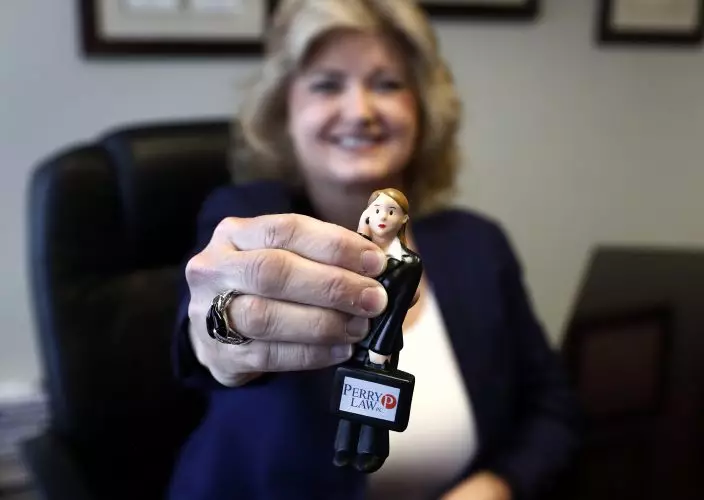
In this Tuesday, May 14, 2019, photo, business owner Meloney Perry, of Perry Law, shows off her miniature Meloney Perry Stress Doll as she poses for a portrait at her law firm in Dallas. Perry once worked at a traditional big law firm with a formal, corporate atmosphere, and knew she wanted a different culture at her own firm. “I learned the ‘old school’ way, but it’s changed,” says Perry. “Nowadays, with the employees coming in younger, you do have to have more of a family feel.” (AP PhotoTony Gutierrez)
Owners who want a good culture will need to be aware of their interactions with staffers — what they do can have a greater impact than what they say.
"Your values really emerge from how you behave," says Tony Fross, who advises clients on workplace practices for the consulting firm Prophet.
For example, micromanagers need to understand they'll get more out of their staffers by giving them autonomy, Fross says.
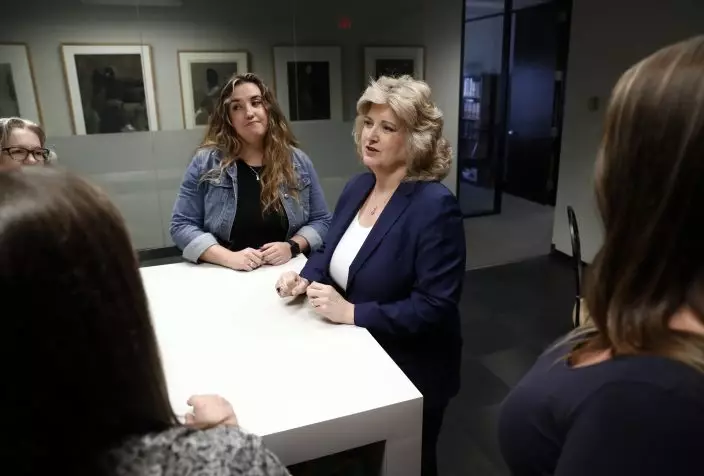
In this Tuesday, May 14, 2019, photo, business owner Meloney Perry, center right, of Perry Law, speaks with members of her staff, attorney Karla Roush, left front, office manager Lisa Amerson, left rear, paralegal Michelle Smith, center left, and paralegal Brooke Bailey, right, as they congregate in the kitchen area at her law firm in Dallas. (AP PhotoTony Gutierrez)
"People live down to your expectations rather than up to them" when they're over-controlled, Fross says. "You need to give people incentives and make it easy from a decision-making perspective to do the things you want them to do."
Culture isn't something many entrepreneurs think of when launching their companies, but many realize as they begin hiring that it needs to be a priority.
"You think so much about the bottom line and being able to expand and hire that you don't always consider other factors," says David Wurst, who says he had no idea about how to develop a company culture when he launched WebCitz, a website development company based in Appleton, Wisconsin. But as he began hiring staffers, prospective employees asked him about the company culture, and also said they hated the suffocating atmosphere at the jobs they were leaving.
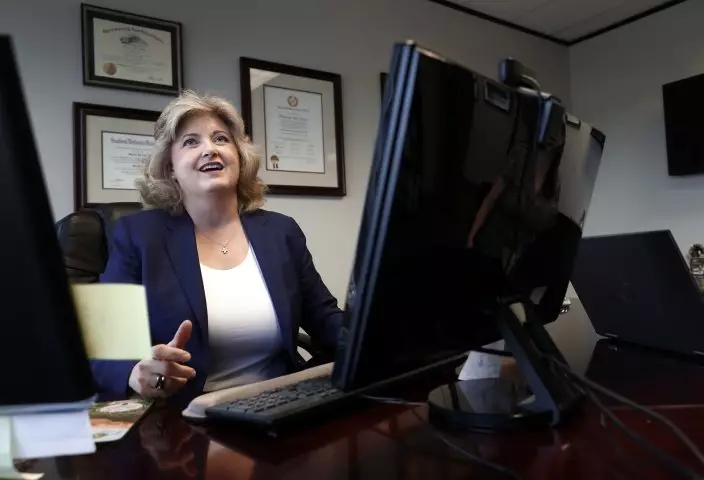
In this Tuesday, May 14, 2019, photo, business owner Meloney Perry sits behind her desk as she speaks with a staff member at her law firm in Dallas. Perry once worked at a traditional big law firm with a formal, corporate atmosphere, and knew she wanted a different culture at her own firm. “I learned the ‘old school’ way, but it’s changed,” says Perry. “Nowadays, with the employees coming in younger, you do have to have more of a family feel.” (AP PhotoTony Gutierrez)
Wurst educated himself by reading about what constitutes a good company culture. He learned "the managers of a business have to understand employees deserve respect and encouragement in order to thrive in their positions, which will help the company as a whole."
So Wurst aims at giving employees opportunities to make a meaningful contribution to the company's growth. He also tries to create a warm and congenial workplace; he takes staffers out for lunch to celebrate successful project launches and is flexible about staffers' personal time.
Melinda Byerley learned from a former employer that a good company culture recognizes staffers as humans with anger and other emotions not always welcome in the workplace.
"We ask everyone to own those emotions and use them productively — whether that's taking a short break or the afternoon off, to admit that something triggers or upsets them, or however they process and deal with those emotions," says Byerley, owner of TimeShare CMO, a digital marketing company based in San Francisco.
Byerley, who has a staff of about 20, also has created what she calls the Rage Cage, a messaging channel where everyone can vent.
"I'm modeling productive behavior as well as making a psychologically safe space for others to acknowledge the very real emotions that come with all humans," she says.
A company's culture shouldn't be set in stone; at some firms, it needs a complete overhaul. When Dave Stout was hired 13 years ago as chief financial officer of Banker Wire, the owners presided over what Stout calls a centralized, controlling environment. He almost quit after the first day. But as Stout gradually took on more responsibility at the Mukwonago, Wisconsin-based manufacturer of wire mesh products, and eventually a 40% stake in the business, he remade the culture.
Stout, who became president 10 years ago, began by increasing staffers' pay and implementing a flexible work schedule. He encouraged their autonomy. He recognized that younger staffers had a different but no less valid way of doing things. He built up their trust.
Today, Stout says, "I think 98% of Banker Wire's culture comes from my colleagues and only 2% comes from me."
Follow Joyce Rosenberg at www.twitter.com/JoyceMRosenberg . Her work can be found here: https://apnews.com
UNITED NATIONS (AP) — The United States vetoed a widely backed U.N. resolution Thursday that would have paved the way for full United Nations membership for Palestine, a goal the Palestinians have long sought and Israel has worked to prevent.
The vote in the 15-member Security Council was 12 in favor, the United States opposed and two abstentions, from the United Kingdom and Switzerland. U.S. allies France, Japan and South Korea supported the resolution.
The strong support the Palestinians received reflects not only the growing number of countries recognizing their statehood but almost certainly the global support for Palestinians facing a humanitarian crisis caused by the war in Gaza, now in its seventh month.
The resolution would have recommended that the 193-member U.N. General Assembly, where there are no vetoes, approve Palestine becoming the 194th member of the United Nations. Some 140 countries have already recognized Palestine, so its admission would have been approved, likely by a much higher number of countries.
U.S. deputy ambassador Robert Wood told the Security Council that the veto “does not reflect opposition to Palestinian statehood but instead is an acknowledgment that it will only come from direct negotiations between the parties."
The United States has “been very clear consistently that premature actions in New York — even with the best intentions — will not achieve statehood for the Palestinian people,” deputy State Department spokesman Vedant Patel said.
His voice breaking at times, Palestinian U.N. Ambassador Riyad Mansour told the council after the vote: “The fact that this resolution did not pass will not break our will and it will not defeat our determination.”
“We will not stop in our effort,” he said. “The state of Palestine is inevitable. It is real. Perhaps they see it as far away, but we see it as near.”
This is the second Palestinian attempt for full membership and comes as the war in Gaza has put the more than 75-year-old Israeli-Palestinian conflict at center stage.
Palestinian President Mahmoud Abbas first delivered the Palestinian Authority’s application for U.N. membership in 2011. It failed because the Palestinians didn’t get the required minimum support of nine of the Security Council’s 15 members.
They went to the General Assembly and succeeded by more than a two-thirds majority in having their status raised from a U.N. observer to a non-member observer state in 2012. That opened the door for the Palestinian territories to join U.N. and other international organizations, including the International Criminal Court.
Algerian U.N. Ambassador Amar Bendjama, the Arab representative on the council who introduced the resolution, called Palestine’s admission “a critical step toward rectifying a longstanding injustice" and said that “peace will come from Palestine’s inclusion, not from its exclusion.”
In explaining the U.S. veto, Wood said there are “unresolved questions” on whether Palestine meets the criteria to be considered a state. He pointed to Hamas still exerting power and influence in the Gaza Strip, which is a key part of the state envisioned by the Palestinians.
Wood stressed that the U.S. commitment to a two-state solution, where Israel and Palestine live side-by-side in peace, is the only path for security for both sides and for Israel to establish relations with all its Arab neighbors, including Saudi Arabia.
“The United States is committed to intensifying its engagement with the Palestinians and the rest of the region, not only to address the current crisis in Gaza, but to advance a political settlement that will create a path to Palestinian statehood and membership in the United Nations,” he said.
Mansour, the Palestinian U.N. ambassador, reiterated the commitment to a two-state solution but asserted that Israel believes Palestine "is a permanent strategic threat."
"Israel will do its best to block the sovereignty of a Palestinian state and to make sure that the Palestinian people are exiled away from their homeland or remain under its occupation forever,” he said.
He demanded of the council and diplomats crowded in the chamber: “What will the international community do? What will you do?”
Israeli-Palestinian negotiations have been stalled for years, and Israel’s right-wing government is dominated by hard-liners who oppose Palestinian statehood.
Israeli U.N. Ambassador Gilad Erdan called the resolution “disconnected to the reality on the ground” and warned that it “will cause only destruction for years to come and harm any chance for future dialogue.”
Six months after the Oct. 7 attack by the Hamas militant group, which controlled Gaza, and the killing of 1,200 people in “the most brutal massacre of Jews since the Holocaust,” he accused the Security Council of seeking “to reward the perpetrators of these atrocities with statehood.”
Israel’s military offensive in response has killed over 32,000 Palestinians, according to Gaza’s health ministry, and destroyed much of the territory, which speaker after speaker denounced Thursday.
After the vote, Erdan thanked the United States and particularly President Joe Biden “for standing up for truth and morality in the face of hypocrisy and politics.”
He called the Palestinian Authority — which controls the West Bank and the U.S. wants to see take over Gaza where Hamas still has sway — “a terror supporting entity.”
The Israeli U.N. ambassador referred to the requirements for U.N. membership – accepting the obligations in the U.N. Charter and being a “peace-loving” state.
“How can you say seriously that the Palestinians are peace loving? How?” Erdan asked. “The Palestinians are paying terrorists, paying them to slaughter us. None of their leaders condemns terrorism, nor the Oct. 7 massacre. They call Hamas their brothers.”
Despite the Palestinian failure to meet the criteria for U.N. membership, Erdan said most council members supported it.
“It’s very sad because your vote will only embolden Palestinian rejectionism every more and make peace almost impossible,” he said.

Algeria's Permanent Ambassador to the United Nations Amar Bendjama speaks during a Security Council meeting at United Nations headquarters, Thursday, April 18, 2024. (AP Photo/Yuki Iwamura)

Israeli Ambassador to the United Nations Gilad Erdan speaks during a Security Council meeting at United Nations headquarters, Thursday, April 18, 2024. (AP Photo/Yuki Iwamura)
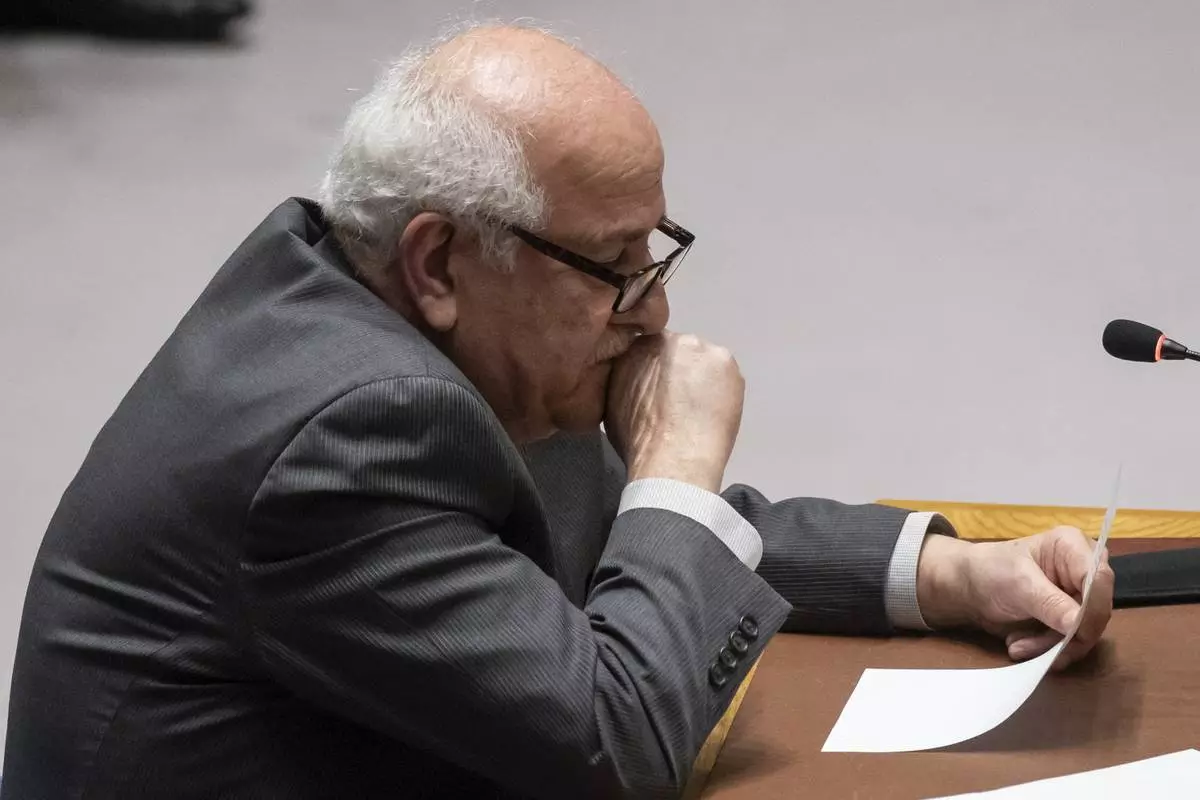
Palestinian Ambassador to the United Nations Riyad Mansour holds tears while speaking during a Security Council meeting at United Nations headquarters, Thursday, April 18, 2024. (AP Photo/Yuki Iwamura)
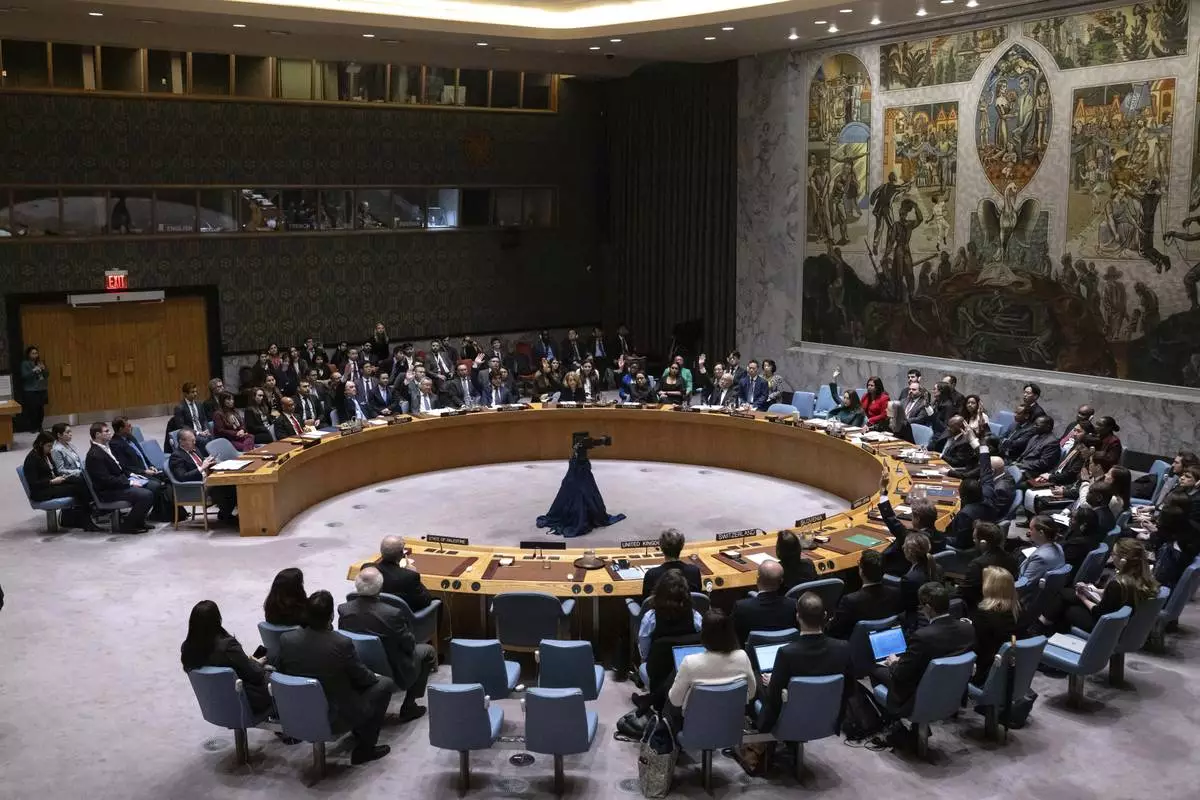
Representatives of member countries take votes during a Security Council meeting at United Nations headquarters, Thursday, April 18, 2024. (AP Photo/Yuki Iwamura)

Palestinian Ambassador to the United Nations Riyad Mansour, left, and United Nations Secretary-General Antonio Guterres speak before a Security Council meeting at the United Nations headquarters, Thursday, April 18, 2024. (AP Photo/Yuki Iwamura)

Palestinian Ambassador to the United Nations Riyad Mansour speaks during a Security Council meeting at United Nations headquarters, Thursday, April 18, 2024. (AP Photo/Yuki Iwamura)

Representatives of member countries take votes during a Security Council meeting at United Nations headquarters, Thursday, April 18, 2024. (AP Photo/Yuki Iwamura)

Israeli Ambassador to the United Nations Gilad Erdan speaks during a Security Council meeting at United Nations headquarters, Thursday, April 18, 2024. (AP Photo/Yuki Iwamura)
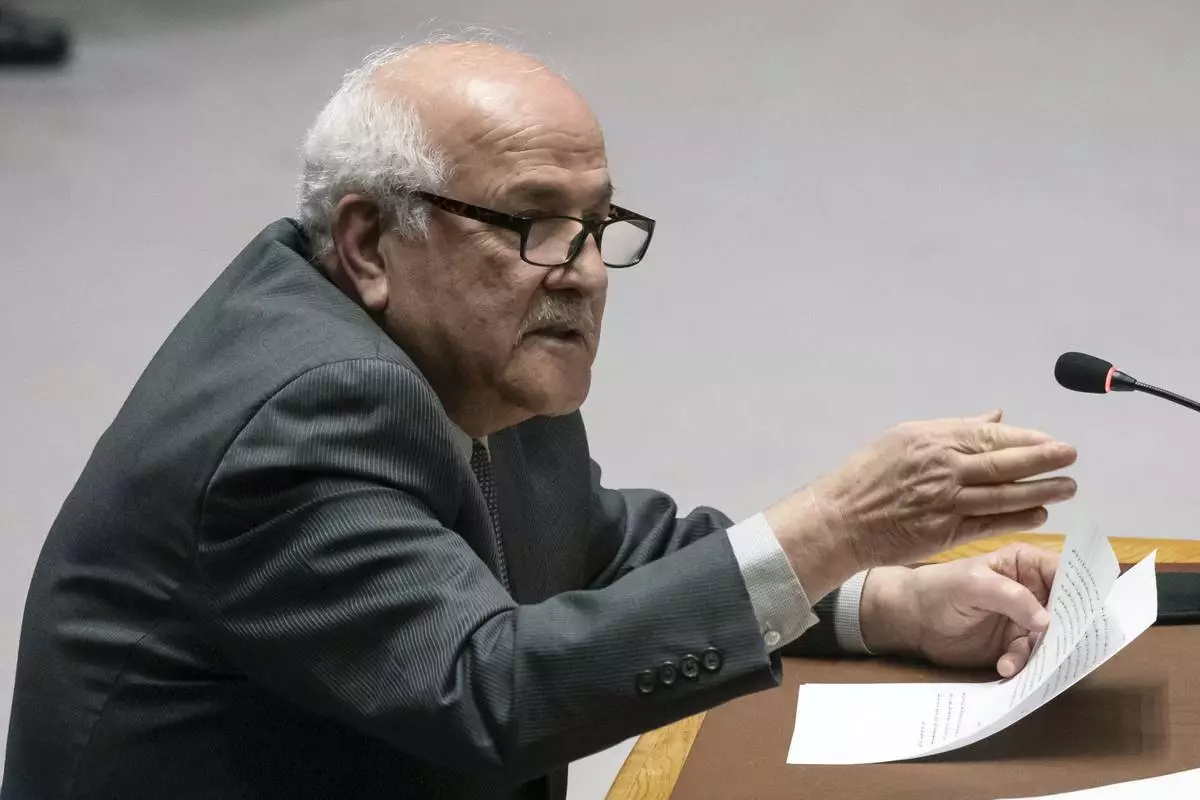
Palestinian Ambassador to the United Nations Riyad Mansour speaks during a Security Council meeting at United Nations headquarters, Thursday, April 18, 2024. (AP Photo/Yuki Iwamura)
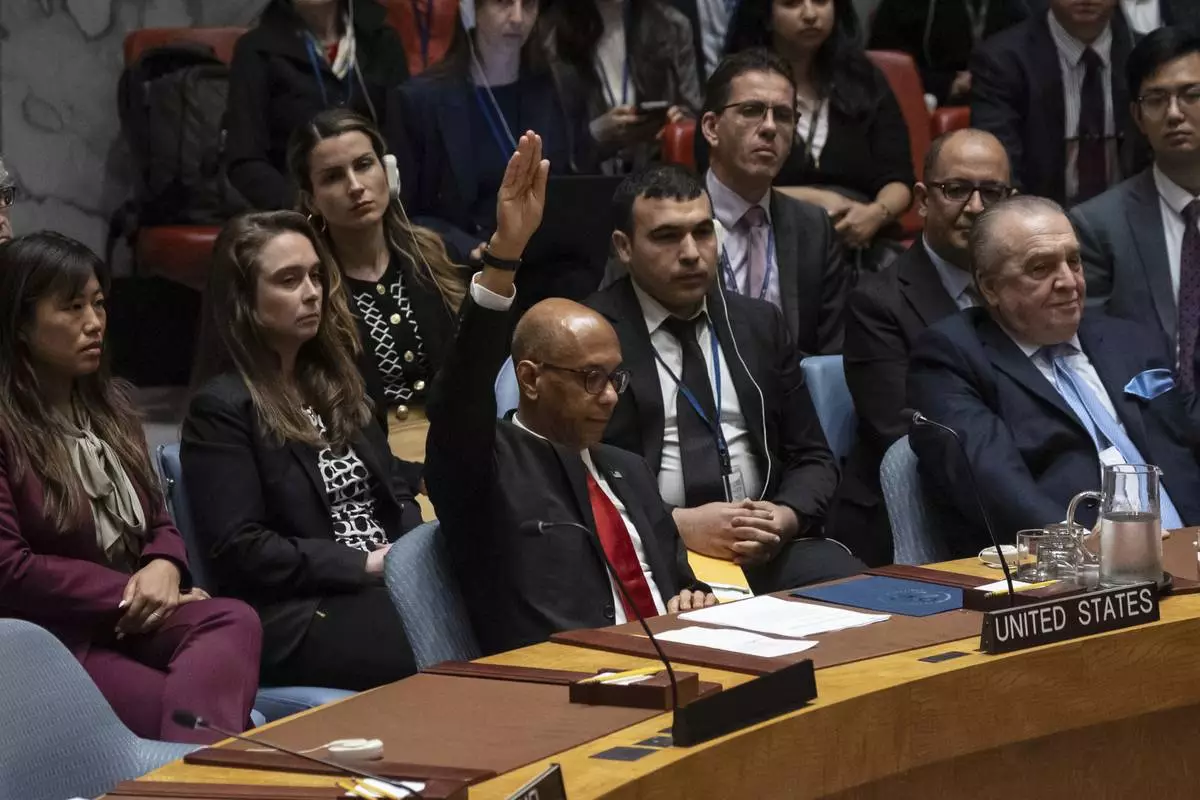
U.S. Deputy Ambassador Robert Wood votes against resolution during a Security Council meeting at United Nations headquarters, Thursday, April 18, 2024. (AP Photo/Yuki Iwamura)
























